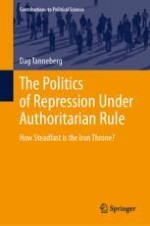2020 | OriginalPaper | Buchkapitel
2. Toward a Theory of Political Repression
verfasst von : Dag Tanneberg
Erschienen in: The Politics of Repression Under Authoritarian Rule
Aktivieren Sie unsere intelligente Suche, um passende Fachinhalte oder Patente zu finden.
Wählen Sie Textabschnitte aus um mit Künstlicher Intelligenz passenden Patente zu finden. powered by
Markieren Sie Textabschnitte, um KI-gestützt weitere passende Inhalte zu finden. powered by
